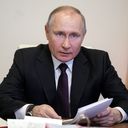U.S. intelligence finds Russia and Iran sought to influence 2020 election, but China did not

The Office of the Director of National Intelligence on Tuesday released a declassified report on foreign actors' attempts to influence and interfere in the 2020 election.
The big picture: The U.S. intelligence community found that Russia and Iran conducted influence operations aimed at affecting the outcome of the election, but that China did not. The report found no indications that foreign actors attempted to alter any technical aspect of the voting process.
Russia: U.S. intelligence agencies assessed that Russian President Vladimir Putin authorized influence operations aimed at denigrating President Biden's candidacy, supporting former President Trump, undermining public confidence in the election and sowing divisions.
- Unlike in 2016, U.S. intelligence did not observe persistent Russian efforts to gain access to election infrastructure.
- A key element of the Kremlin's strategy was directing Russian proxies, including sanctioned Ukrainian lawmaker Andrii Derkach, to "use prominent U.S. persons and media conduits to launder their narratives to U.S. officials and audiences" — including some individuals close to Trump.
- The report assesses that Putin "had purview over" Derkach's activities, which included meeting with Rudy Giuliani to discuss Biden's and his son Hunter's dealings in Ukraine. Derkach and other Russian proxies provided materials to "Trump administration-linked individuals" to advocate for formal investigations into the Bidens.
China: The report assesses that Beijing "did not deploy interference efforts and considered but did not deploy influence efforts" intended to change the outcome of the election.
- "China sought stability in its relationship with the United States, did not view either election outcome as being advantageous enough for China to risk getting caught meddling, and assessed its traditional influence tools — primarily targeted economic measures and lobbying — would be sufficient to meet its goal of shaping U.S.-China policy regardless of the winner."
- "We assess that Beijing also believes there is a bipartisan consensus against China in the United States that leaves no prospect for a pro-China administration regardless of the election outcome," the report adds.
- The assessment contradicts pre-election statements from the Trump administration, which frequently sought to paint China as the greater threat to U.S. elections. In a "minority view" included in the report, the National Intelligence Office for Cyber assessed that China took "at least some steps" aimed at undermining Trump through social media and official statements.
Iran: The report assessed that Iranian Supreme Leader Ayatollah Ali Khamenei authorized a "multi-pronged covert influence campaign" aimed at damaging Trump's election prospects and undermining confidence in the election.
Other actors: Lebanese Hezbollah, Cuba, Venezuela and some profit-motivated cyber criminals were also involved in smaller-scale attempts to influence the election, according to the assessment.